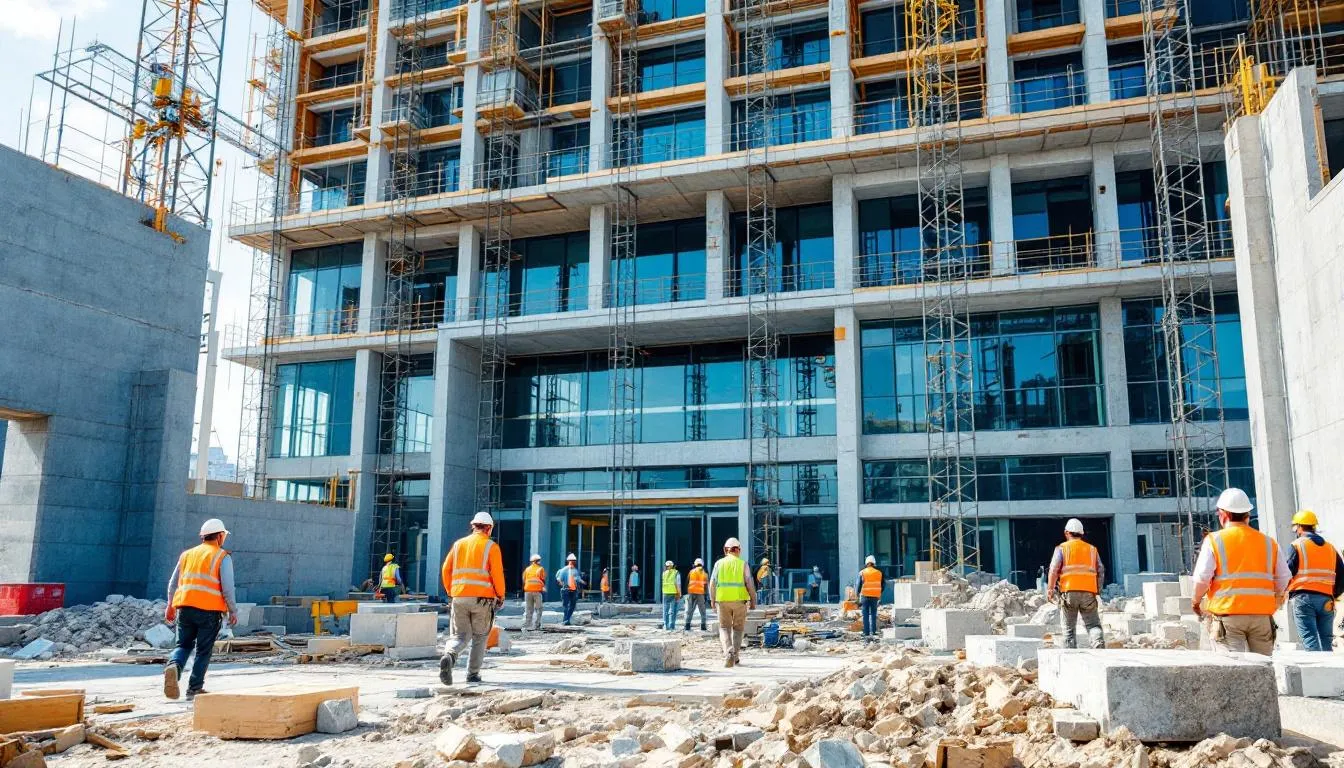Hotel Pre-Opening: Launch Your Property Successfully
 Mika Takahashi
Mika Takahashi Mika Takahashi
Mika TakahashiOpening a new hotel is one of the most exciting and significant investments you can make in the hospitality world. But here’s the hard truth: about half of all hotel failures happen during the crucial pre opening phase. That’s why the months leading up to your hotel’s debut are absolutely make-or-break for your property’s long-term success.
The hotel pre opening process isn’t just about getting rooms ready or training staff. It’s a complex, multi-layered operation that demands thoughtful planning, attention to detail, and smooth coordination across every department. From defining your brand identity to setting up the latest technology systems, every choice you make during this time will shape your hotel’s reputation, efficiency, and financial health for years to come.
In this all-encompassing guide, we’ll take you through everything you need to know to launch your hotel property the right way. Whether you’re opening a cozy boutique spot or a large branded hotel, you’ll find the essential steps, timelines, and insider tips that separate successful hotel openings from costly missteps. Let’s get started on the roadmap to a memorable grand opening and a strong foundation for lasting success in the competitive hospitality industry.

Hotel pre opening refers to that critical 6-12 month stretch between when construction wraps up and when your doors officially open to guests. This intense period covers everything from hiring and training your team to rolling out technology and setting up operational procedures that will define your guest experience.
The stakes couldn’t be higher. Research shows hotels that skimp on their pre opening process tend to earn about 40% less revenue in their first year compared to those that invest in thorough preparation. And remember, you only get one shot to make a first impression — both with your future guests and your local market.
During this phase, you’re essentially laying the groundwork for your hotel’s entire future. This means setting brand standards, creating standard operating procedures, implementing your property management system, and building the service culture that will make your hotel stand out. The choices you make now will influence everything from how long staff stay with you to the reviews guests leave online for years down the road.
The financial impact is just as important. Hotels that take the time to prepare properly usually see 15-20% higher occupancy rates in their first year. Plus, they can often charge premium rates from day one, because guests quickly notice the superior service and smooth operations.
Most importantly, the pre opening phase gives you the chance to fix problems before they become headaches. Issues that might take months to sort out once you’re open can be addressed ahead of time, making sure your opening day goes off without a hitch and your early guests become your biggest fans.
Every successful hotel opening starts with a solid business plan that looks well beyond the opening day. Your plan should include detailed 10-year cash flow projections that take into account market ups and downs, seasonal trends, and the competition you’ll face once you open.
Good strategic planning begins with understanding who your ideal guests are. Dive deep into market research — look at demographics, travel habits, and spending patterns of people visiting your area. Are you aiming to attract business travelers who want efficiency and modern amenities? Leisure tourists hunting for unique experiences? Families looking for space and activities? Knowing your audience will guide everything from room design to the services you offer.
Hotel competitive analysis is another key piece. Check out similar hotels within a 5-mile radius — what are their prices, amenities, service levels, and online reputations like? Look especially at properties that opened recently to learn from their wins and missteps.
From this research, craft a unique value proposition that clearly states what makes your hotel special. It could be your location, your style, your service approach, or standout amenities. Whatever it is, make sure it’s authentic, sustainable, and meaningful to your target guests. This value proposition will steer your marketing, training, and operational choices throughout the pre opening journey.
Don’t forget brand identity — this goes beyond logos and colors to include the whole guest experience you want to create. How your staff greet guests, the tone of your website, and your social media voice all play a role.
Timing matters, too. Start your business plan at least 12 months before opening so you have enough time for research and refinement. Finalize your brand identity 8-10 months before opening to ensure consistency across marketing, signage, and training.
Your hotel’s success in the pre opening phase depends heavily on having the right people in place. Begin recruiting your general manager 6-8 months before opening. This person will be your go-to leader for managing the entire pre opening process and should bring solid hotel operations experience and preferably past pre-opening know-how.
When hiring your general manager, look for strong project management skills alongside hospitality expertise. The pre opening phase is a juggling act of many moving parts, so you want someone who can keep everything on track without losing sight of details. Ideally, they’ve opened hotels in similar markets or with similar service levels.
Department heads come next, about 4-6 months before opening. These leaders — front office manager, housekeeping supervisor, food and beverage director, sales manager — will set up their departments and train their teams. They should help develop standard operating procedures that align with your brand standards and guest experience goals.
Cultural fit is just as important as skills. The pre opening period is intense, with long hours and lots of pressure. You want team members who share your service values and bring resilience, adaptability, and a positive spirit. That kind of culture translates directly into better guest service.
Start designing your training program as soon as your department heads are on board. Good hotel pre opening training covers three areas: technical role skills, brand standards and service philosophy, and teamwork and communication. Plan for 2-3 weeks of focused training before your soft opening, with ongoing coaching afterward.
Cross-training is a smart move, too. It prepares staff to help out in different departments during busy times or absences. This flexibility helps during the opening months when you’re still fine-tuning staffing and demand patterns. Plus, cross-trained employees usually have a broader understanding of hotel operations, which improves guest service and teamwork.

Your front office is the face of your hotel — the first and last impression every guest gets. Setting it up right is critical. Make sure you have reliable front desk equipment: computers, check-in terminals, key card programmers, cash drawers, credit card machines, and backup communication tools. Test everything thoroughly and train staff on what to do if systems fail.
Set up your reservation system carefully, with accurate room inventories, rate structures, and integration with online booking channels. Your property management system should automate confirmations for direct bookings and handle modifications, cancellations, and group reservations smoothly. Test all scenarios before opening.
Develop clear check-in and check-out procedures that cover common situations like early arrivals, late checkouts, billing questions, and special requests. Train your front desk team on upselling and local knowledge to boost guest experience and revenue.
Extend your guest communication beyond face-to-face to include phone, email, and messaging through your website or app. Set response time standards and create templates for common inquiries, but train staff to personalize replies. Consider a guest messaging platform for seamless communication throughout the guest journey.
Housekeeping sets the tone for cleanliness and comfort. Establish detailed room setup standards — how beds should be made, where amenities go, towel arrangements, and cleanliness benchmarks. Use photo guides to ensure consistency.
Create cleaning protocols for daily upkeep and deep cleaning of guest rooms, public areas, and back-of-house spaces. Set time standards but never sacrifice quality for speed. Include procedures for handling maintenance issues found during cleaning or reported by guests.
Plan inventory carefully for linens, amenities, and cleaning supplies. Calculate par stock levels based on occupancy forecasts, delivery schedules, and storage space. Use tracking systems to monitor usage and automate reordering. Account for seasonal demand changes.
Implement quality control with regular inspections using standardized checklists. Train supervisors to inspect thoroughly and give constructive feedback. Use scoring systems to track trends and identify training needs.
Set preventive maintenance schedules to avoid equipment failures that disrupt guests and cost money. Create calendars for HVAC, plumbing, electrical, and room amenities. Train maintenance staff on inspections and reporting protocols.
Menu design and pricing need a balance of guest appeal, efficiency, and profit. Create menus that reflect your concept and kitchen capabilities. Price items to hit your target food cost while staying competitive.
Install kitchen equipment and train staff well ahead of opening to catch issues early and ensure food safety. Schedule deliveries 6-8 weeks before opening for testing and adjustments.
Start liquor licensing and food safety certification processes 4-6 months before opening to avoid delays. Train staff on responsible alcohol service and food safety, keeping documentation handy.
Set up your POS system with accurate menu items, prices, and taxes, and integrate it with your property management system for room charges. Establish inventory tracking and automated reordering for high-volume items.
Technology is the backbone of modern hotel operations. During pre opening, plan and implement your key systems: property management system (PMS), revenue management system (RMS), and central reservation system (CRS). Make sure they integrate smoothly for real-time data sharing and to avoid duplicate entries that cause errors.
Choosing and setting up your PMS is one of the most important tech decisions. It should manage reservations, check-ins and outs, room assignments, billing, and reporting, and connect with other systems. Configure room types, rate codes, guest profiles, and reports during pre opening. Train staff thoroughly on all functions.
Plan your WiFi carefully for reliable coverage everywhere. Today’s guests expect fast internet, so it’s a must-have, not a luxury. Design for peak usage and separate secure networks for operations. Test signal strength in all rooms and public spaces before opening.
Install security systems, key card programming, and access control with vendor coordination and thorough testing to keep guests safe. Program different access levels for guests, staff, and management. Train staff on handling access issues and emergencies.
Mobile check-in and guest messaging are now standard expectations. Implement apps that let guests check in remotely, choose rooms, and communicate with staff. These reduce front desk workload and add convenience.
Consider contactless payments and digital keys to enhance convenience and hygiene. These gained importance during the pandemic and continue to appeal to guests.

Your hotel’s website with a direct booking engine is your most powerful marketing tool and revenue driver. It should highlight your property’s unique features and offer an easy booking experience. Use SEO strategies to help potential guests find you when searching for accommodations in your area.
Make sure your booking engine offers competitive rates, flexible cancellations, and special packages that go beyond what third-party sites offer. Integrate it with your PMS for real-time inventory updates to avoid overbooking.
Start your social media strategy months before opening to build buzz. Share behind-the-scenes looks at construction, team intros, and sneak peeks of rooms and amenities. Engage with local groups, tourism boards, and influencers to expand your reach.
Invest in professional photography and video that showcase your hotel’s unique style and brand identity. Experienced hospitality photographers know how to capture spaces that appeal to guests.
Partner with OTAs like Booking.com and Expedia for broad distribution, but manage rates and inventory carefully. Negotiate good commission rates and use channel management software to keep prices and availability consistent.
Develop a marketing mix of digital and traditional channels based on your target audience. This might include Google Ads, social media ads, email campaigns, local print ads, or partnerships with attractions. Allocate your budget where it will have the most impact.
Plan a PR campaign with media outreach and influencer partnerships to generate buzz and credibility. Identify local journalists, bloggers, and social media stars who align with your market. Use press releases, property tours, and special events to get coverage and social media attention.
A detailed pre opening budget is key to managing cash flow and making sure you have enough funds to reach profitability. Pre opening costs can range from $500,000 to $2 million depending on your property size, brand rules, and local market.
Budget for staff recruitment and training, marketing, technology, initial inventory, licenses and permits, insurance, utilities, and working capital for the first months. Track expenses carefully to avoid surprises that could delay your opening.
Plan monthly expenses to rise gradually as you get closer to opening. Early months focus on hiring and marketing prep; later months ramp up training, inventory buying, and marketing campaigns. Expect higher costs right after opening as you optimize operations.
Include a 10-15% contingency for budget overruns — delays, regulatory changes, tech issues, or market shifts can all add unexpected costs. Keep access to extra funds so you can handle surprises without compromising quality or timing.
Consider hiring a hospitality financial consultant who knows hotel pre openings. They can spot cost savings and make sure your budget covers all the bases.
Create a month-by-month checklist starting 12 months before opening to keep everything on track. Assign responsibilities and deadlines for every task to ensure a smooth launch.
At 12 months out, focus on strategic planning: finalize your business plan, secure financing, and start recruiting your general manager. Begin building your brand identity and marketing awareness.
At 9 months, hire your general manager and start department head recruitment. Develop standard operating procedures and service standards. Begin liquor licensing and other regulatory approvals.
At 6 months, complete core management team hiring and training program development. Finalize vendor contracts and launch marketing campaigns. Complete website development.
At 3 months, finish hiring and start intensive staff training. Complete technology installations and testing. Finish regulatory inspections and fix compliance issues.
Track key milestones like permit approvals, hiring completion, system setups, and marketing launches. Hold regular progress reviews to catch problems early.
Plan your soft opening 2-4 weeks before the grand opening. This trial period lets you test systems and procedures with real guests and gather feedback. Offer reduced rates to manage expectations.
In the final week, use daily task lists to cover last-minute equipment tests, staff briefings, inventory checks, marketing activations, and grand opening prep. Use detailed checklists and clear responsibilities to avoid chaos.

Construction delays are a frequent hurdle that can push back your opening and hurt revenue. Have contingency plans with flexible staff schedules, marketing timelines, and guest communication strategies. Stay in close contact with your construction team and tackle delays head-on.
If construction stalls, keep working on things that don’t depend on finished rooms — staff training, system testing, marketing, and vendor relationships. Use the extra time productively.
Staffing can be tough as hospitality pros may be busy elsewhere or wary of joining a new place. Have backup recruitment plans like referral programs, hospitality school partnerships, and temp agencies. Offer competitive pay and growth opportunities.
Keep your team motivated by fostering a positive workplace and clear paths for advancement. Staff who join during pre opening often develop strong loyalty. Recognize their efforts and offer leadership training.
Permit and licensing delays can stall food and beverage operations. Start applications early and keep in touch with regulators. Build relationships with officials and consider hospitality licensing consultants.
Have backup plans for licensing delays — limited food service, partnerships with local restaurants, or focusing on room revenue first. Be transparent with guests about any service limits.
Tech integration problems can disrupt reservations and room access. Work with experienced vendors and have backup plans. Test installations with plenty of buffer time.
If tech issues arise, prioritize guest-facing systems. Train staff on manual backups and consider phased rollouts, opening with basic systems first.
Set key performance indicators (KPIs) to track your pre opening progress and spot areas needing attention. Important metrics include staff retention, training completion, system milestones, marketing reach, and budget adherence.
Staff retention is especially important — turnover disrupts training and delays readiness. Monitor by department and role, and investigate any red flags. High retention usually means good management and culture.
Track training completion rates and competency scores. Well-trained staff lead to happier guests and smoother operations.
Use soft opening data to gauge readiness — check-in times, housekeeping turnover, complaint rates, and staff confidence. Use feedback to fine-tune before the grand opening.
Gather guest feedback during soft opening through surveys and observation. Watch for recurring issues and fix them. Positive feedback can fuel marketing and staff recognition.
In the first month, track operational efficiency metrics like staff productivity, system uptime, complaint resolution, and cost control. These often predict long-term success better than occupancy or revenue alone.
Monitor revenue management closely — booking patterns, rate acceptance, and channel performance. Identify which marketing channels bring the best guests and adjust distribution accordingly. Keep an eye on competitors and market demand to optimize pricing.
For the first year, track guest satisfaction, staff retention, revenue vs. budget, and market share. Establish baselines early and review quarterly. Use these insights to guide service improvements, marketing, and operations.
After six months, review your pre opening process. Document what worked and what didn’t to build knowledge for future projects and share with peers. This continuous improvement is invaluable.
Consider third-party assessments to get objective feedback on your operations compared to industry standards. Their insights can highlight opportunities and confirm your successes.
Pulling off a successful hotel pre opening takes detailed planning, experienced leadership, and relentless attention to detail across every part of your business. From crafting a comprehensive business plan and building the right team to rolling out advanced technology and compelling marketing, every piece matters for your long-term success.
The numbers don’t lie: hotels that invest time and effort in pre opening consistently outperform those that rush. Your detailed pre opening budget, realistic opening date, and systematic approach to training and systems will be the difference between thriving and struggling.
Remember, the pre opening phase is your chance to lay the foundation for operational excellence, guest satisfaction, and financial success. The standard operating procedures you create, the culture you build, and the guest experience you design now will shape your hotel’s reputation and performance for years.
As you set out on this exciting journey, focus on building a thorough business plan that covers every angle while staying flexible enough to handle surprises. Invest in the right people, implement proven systems, and never compromise on quality — that’s how you’ll stand out in today’s competitive hospitality industry.
Your successful hotel opening is within reach — with careful preparation, expert guidance, and commitment to excellence, you’ll be ready to welcome your first guests and start building lasting relationships that drive long-term success.